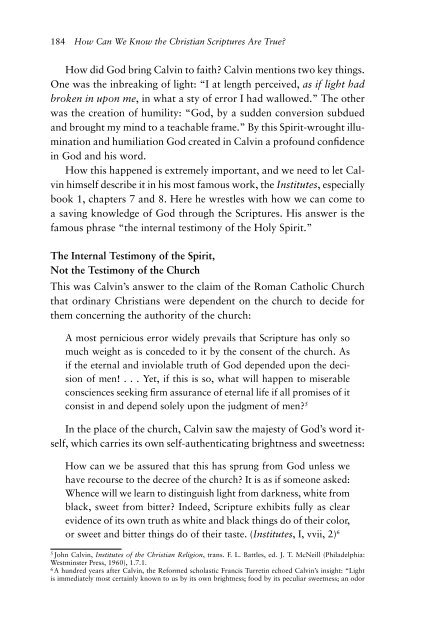Scriptures selfattesting authority question doctrine truthfulness Scriptures
peculiar-glory-en
peculiar-glory-en
You also want an ePaper? Increase the reach of your titles
YUMPU automatically turns print PDFs into web optimized ePapers that Google loves.
184 How Can We Know the Christian <strong>Scriptures</strong> Are True?<br />
How did God bring Calvin to faith? Calvin mentions two key things.<br />
One was the inbreaking of light: “I at length perceived, as if light had<br />
broken in upon me, in what a sty of error I had wallowed.” The other<br />
was the creation of humility: “God, by a sudden conversion subdued<br />
and brought my mind to a teachable frame.” By this Spirit-wrought illumination<br />
and humiliation God created in Calvin a profound confidence<br />
in God and his word.<br />
How this happened is extremely important, and we need to let Calvin<br />
himself describe it in his most famous work, the Institutes, especially<br />
book 1, chapters 7 and 8. Here he wrestles with how we can come to<br />
a saving knowledge of God through the <strong>Scriptures</strong>. His answer is the<br />
famous phrase “the internal testimony of the Holy Spirit.”<br />
The Internal Testimony of the Spirit,<br />
Not the Testimony of the Church<br />
This was Calvin’s answer to the claim of the Roman Catholic Church<br />
that ordinary Christians were dependent on the church to decide for<br />
them concerning the <strong>authority</strong> of the church:<br />
A most pernicious error widely prevails that Scripture has only so<br />
much weight as is conceded to it by the consent of the church. As<br />
if the eternal and inviolable truth of God depended upon the decision<br />
of men! . . . Yet, if this is so, what will happen to miserable<br />
consciences seeking firm assurance of eternal life if all promises of it<br />
consist in and depend solely upon the judgment of men? 5<br />
In the place of the church, Calvin saw the majesty of God’s word itself,<br />
which carries its own self-authenticating brightness and sweetness:<br />
How can we be assured that this has sprung from God unless we<br />
have recourse to the decree of the church? It is as if someone asked:<br />
Whence will we learn to distinguish light from darkness, white from<br />
black, sweet from bitter? Indeed, Scripture exhibits fully as clear<br />
evidence of its own truth as white and black things do of their color,<br />
or sweet and bitter things do of their taste. (Institutes, I, vvii, 2) 6<br />
5<br />
John Calvin, Institutes of the Christian Religion, trans. F. L. Battles, ed. J. T. McNeill (Philadelphia:<br />
Westminster Press, 1960), 1.7.1.<br />
6<br />
A hundred years after Calvin, the Reformed scholastic Francis Turretin echoed Calvin’s insight: “Light<br />
is immediately most certainly known to us by its own brightness; food by its peculiar sweetness; an odor


